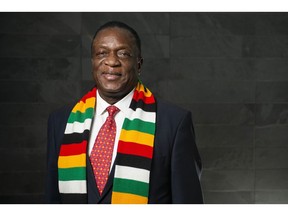Article content
(Bloomberg) — Zimbabwean President Emmerson Mnangagwa’s six years of wooing the United Arab Emirates has given a lifeline to a nation that the West has ostracized for a quarter century and is unable to repay its loans to China.

Zimbabwean President Emmerson Mnangagwa’s six years of wooing the United Arab Emirates has given a lifeline to a nation that the West has ostracized for a quarter century and is unable to repay its loans to China.

(Bloomberg) — Zimbabwean President Emmerson Mnangagwa’s six years of wooing the United Arab Emirates has given a lifeline to a nation that the West has ostracized for a quarter century and is unable to repay its loans to China.
Article content
Article content
The wealthy Gulf state has overtaken China to become the resource-rich nation’s biggest export partner and since 2022 has plowed $1.4 billion into everything from gold trading to real estate. The steps are part of a wider effort by the UAE to build influence across Africa that’s seen it become the country that routinely pledges the most foreign direct investment into the continent.
Advertisement 2
This advertisement has not loaded yet, but your article continues below.
THIS CONTENT IS RESERVED FOR SUBSCRIBERS ONLY
Subscribe now to read the latest news in your city and across Canada.
SUBSCRIBE TO UNLOCK MORE ARTICLES
Subscribe now to read the latest news in your city and across Canada.
REGISTER / SIGN IN TO UNLOCK MORE ARTICLES
Create an account or sign in to continue with your reading experience.
THIS ARTICLE IS FREE TO READ REGISTER TO UNLOCK.
Create an account or sign in to continue with your reading experience.
or
Article content
“The UAE has gone within a few years from being unknown in commerce to becoming the nation’s foremost trading partner,” Eldred Masunungure, a political science professor at the University of Zimbabwe, said.
In Mount Hampden, 11 miles northeast of Harare, Shaji Ul Mulk, a Dubai-based businessman who owns Mulk International, is developing a flagship “cyber city” for the rich to replace the capital, which is in ruin. The Dubai Gold & Commodities Exchange has a pact to establish a gold market and miner Bluefin Gold Group plans to set up in the country.
The oil-rich Gulf state is also consistently among the southern African nation’s top five foreign direct investment sources, according to the Zimbabwe Investment and Development Agency. And it doesn’t plan to let up.
The UAE wants to maintain and expand its relationships with Zimbabwe in line with its broader foreign policy objectives, a UAE official who asked not to be identified said.
Still, caution may be warranted because of the state of Zimbabwe’s economy. The southern African nation’s debt pile has ballooned to $21 billion since a default in 1999. Its sixth attempt at a viable local currency in 16 years is foundering less than nine months after debut. The economy is largely informal, high inflation, the economy’s Achilles’ heel, persists, making it difficult for big businesses to flourish.
Top Stories
Get the latest headlines, breaking news and columns.
By signing up you consent to receive the above newsletter from Postmedia Network Inc.
Thanks for signing up!
A welcome email is on its way. If you don’t see it, please check your junk folder.
The next issue of Top Stories will soon be in your inbox.
We encountered an issue signing you up. Please try again
Article content
Advertisement 3
This advertisement has not loaded yet, but your article continues below.
Article content
Petrodollars
Gulf states are increasingly using their petrodollars to build influence in Africa, as China pares back loans to the continent, Europe scales back its presence and the US becomes more domestically focused.
The UAE has invested $110 billion in Africa spread across trade, investment, renewable energy, logistics, food security and infrastructure, according to its government.
Its strategic investments are made with the prospect of earning outsized returns, said Jim Krane, a fellow at Rice University’s Baker Institute for Public Policy in Houston. The investing firms, which are mostly state-linked, target countries where they can advance the strategic interests of the UAE and “are willing to overlook some of the risks that have otherwise prevented firms from entering these frontier markets,” he added.
“There are diplomatic motivations that go beyond profitability, but profits are still expected,” said Krane.
Last year, the Abu Dhabi wealth fund ADQ agreed to invest $35 billion in Egypt, most of it to develop prime land on the North African nation’s Mediterranean coast. That rescued the economy from its worst foreign-exchange crisis in decades.
Advertisement 4
This advertisement has not loaded yet, but your article continues below.
Article content
You can follow Bloomberg’s reporting on Africa on WhatsApp. Sign up here.
The UAE’s decision to invest in Zimbabwe came after Mnangagwa visited the country in 2019 as part of a roadshow to attract investment into an economy that was in freefall and locked out of capital markets because of sanctions, the debt default and decades of misrule by Robert Mugabe.
The UAE was mainly attracted to Zimbabwe’s gold which has become a “bright spot” for the economy, Lyle Begbie, an economist at Oxford Economics said. Last year output rose to a record 36 tons.
Ties to the UAE provided Zimbabwe with “options for survival,” senior officials in Mnangagwa’s administration said in 2019 — and still do, said Hasnain Malik, an emerging market strategist at Tellimer in Dubai.
“UAE investment inflows are nowhere near large enough, on their own, to build up the foreign reserves needed to support a stable currency,” he said. “The economic solution for Zimbabwe requires addressing sovereign debt arrears, committing to a credible fiscal path, unlocking multilateral finance and foreign direct investment, and, ultimately, allowing a freer float of the currency.”
Sign up for the twice-weekly Next Africa newsletter for the latest business and economic news from the continent.
Article content
Share this article in your social network